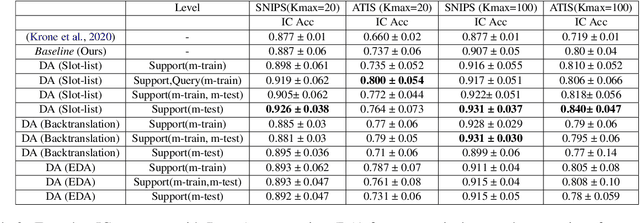Karine lp Kiun Chong
Semi-Supervised Few-Shot Intent Classification and Slot Filling
Sep 17, 2021



Abstract:Intent classification (IC) and slot filling (SF) are two fundamental tasks in modern Natural Language Understanding (NLU) systems. Collecting and annotating large amounts of data to train deep learning models for such systems is not scalable. This problem can be addressed by learning from few examples using fast supervised meta-learning techniques such as prototypical networks. In this work, we systematically investigate how contrastive learning and unsupervised data augmentation methods can benefit these existing supervised meta-learning pipelines for jointly modelled IC/SF tasks. Through extensive experiments across standard IC/SF benchmarks (SNIPS and ATIS), we show that our proposed semi-supervised approaches outperform standard supervised meta-learning methods: contrastive losses in conjunction with prototypical networks consistently outperform the existing state-of-the-art for both IC and SF tasks, while data augmentation strategies primarily improve few-shot IC by a significant margin.
 Add to Chrome
Add to Chrome Add to Firefox
Add to Firefox Add to Edge
Add to Edge